#by posting SW meta?
Text
Debunking more myths in the GFFA: the Jedi and the clones.
I wrote a post debunking the various myths about how "the Jedi condone slavery", a while ago. Something I had omitted (because it's such a big topic) was the following two statements that concern the clone troopers' relations with the Jedi:
"The clones were genetically bred to have accelerated growth, so they're technically child soldiers."
"The clones were slaves of the Jedi."
Both the above statements are inaccurate, let's explore why.

"The clones were child soldiers"
Let's get the easy one out of the way first, because it's a logic that cuts both ways. If age is our only determination of the maturity of a Star Wars character, then Grogu is not a baby. He is aged 50, and is thus a middle-aged man.
Who cruelly eats the babies of a woman...

... and knowingly tortures animals for his own sadistic pleasure.

Of course, I'm kidding. Grogu's none of the above things.
The narrative frames him as a cute baby who does innocent baby stuff. Him eating the eggs is played off as comedic, as is him lifting with the frog. To this day, some fans still call him "Baby Yoda".
Conversely, despite the clones being 10/14-years-old, their actions, behaviors, way of thinking, sense of humor, morals etc, are all those of an adult.
Like, Ahsoka is technically older than Rex in this scene.

The scene doesn't portray them as peers, though. This isn't written as "a teen and a tween talking". No, Rex looks, acts and behaves like a grown-up and is thus framed as such by the narrative.
You can make the argument "they're child soldiers", but (unless you're doing so in bad faith) you'd also have to argue that "Grogu's an adult".

"The clones were the Jedi's slaves"
Nope. For all intents and purposes, they're in the same boat as the Jedi, who George Lucas stated multiple times had been drafted to fight in the war.
Again: both the Jedi (monk/diplomats untrained for fighting on a battlefield) and clones (literally bred en masse only to fight) are being forced to fight by Palpatine and the Senate.

Though, on paper, the clones were commissioned by Jedi Master Sifo-Dyas, it was actually done by the Sith (who either manipulated or assassinated Sifo-Dyas then stole his identity, depending on the continuity you choose to adhere to). The rest of the Jedi had no idea these clones were being created.
So while the clones are slaves... they're not owned by the Jedi.
They're the army of the Republic, they belong to the Senate. This isn't exactly a scoop, they refer to the clones as something to purchase...
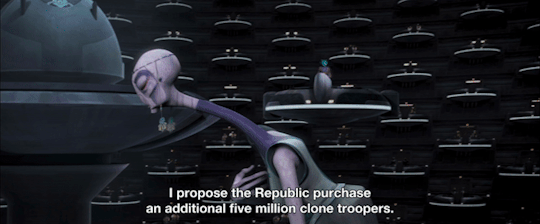
... and manufacture.

As far as the Senate’s concerned, clones are property, like droids.
Like there's a whole subplot in The Bad Batch about this very point: after the war, the clones are decommissioned and left out to dry because they literally have no rights, they served their purpose.
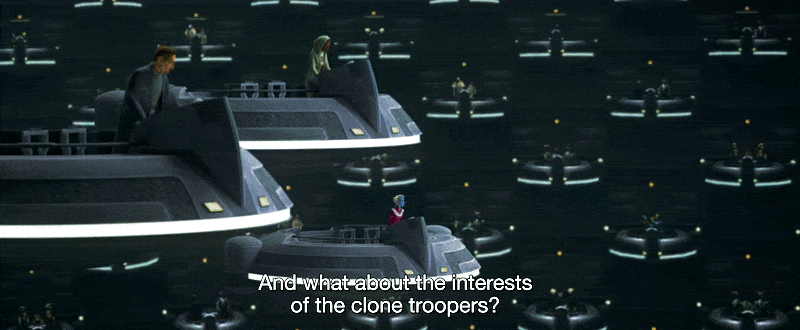
The only trooper to ever canonically blame the Jedi for the clones' enslavement is Slick, who the narrative frames as having been bribed and manipulated by Asajj Ventress into betraying his comrades.
Also, the only canonical Jedi shown to ever be mean, dismissive or mistreating the clones in any way, is Pong Krell.

And it's eventually revealed he’s in fact a full-on traitor, hence why the story frames him as an antagonistic dick from the moment he's introduced. He doesn’t represent the Jedi in any way.
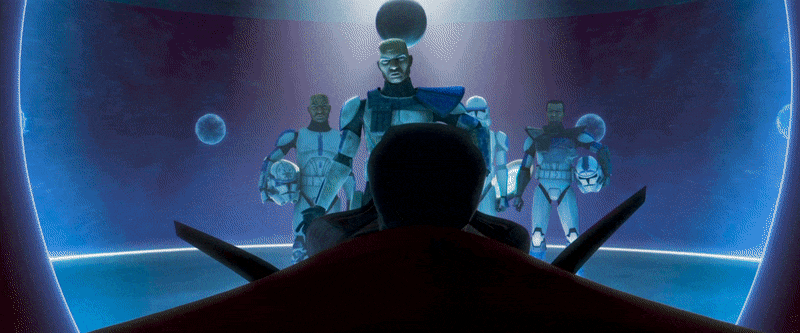
We know this because the other Jedi we’ve been shown are always prioritizing their clones’ lives over theirs, if given the chance.

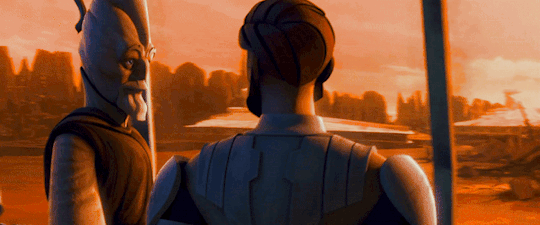
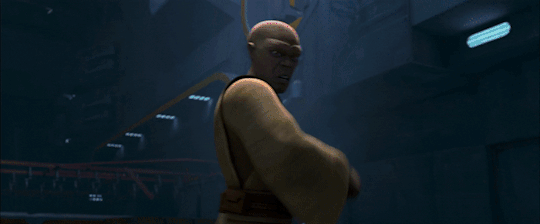
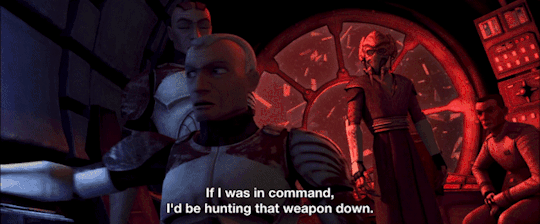
Finally, if we wanna get even more specific... as Commander-in-Chief of the Grand Army of the Republic (GAR), the clones belong to Palpatine.
Palpatine who is a Sith Lord.
Palpatine who arranged for the creation of the clones and had them all injected with a chip that would activate upon hearing a code-word...
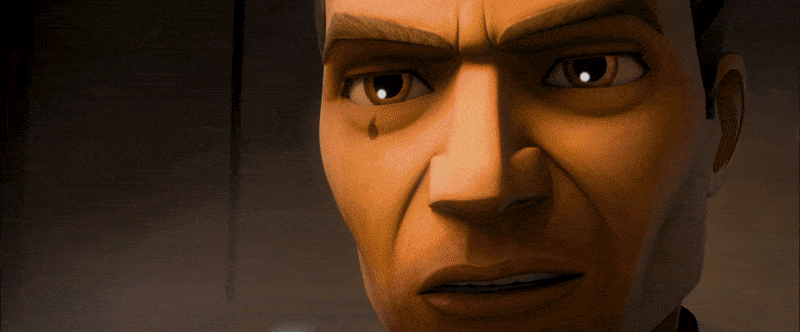
... and forced them to murder their Jedi without hesitation or remorse.
When you bear all that ⬆️ in mind and when you read this quote by George Lucas...
"The Jedi won't lead droids. Their whole basis is connecting with the life force. They'd just say, 'That's not the way we operate. We don't function with non-life-forms.” So if there is to be a Republic army, it would have to be an army of humans."
- The Star Wars Archives: 1999-2005, 2020
... narratively-speaking, everything falls into place.
Sidious knows that:
If he orchestrates a war designed to thin the Jedi's numbers, corrupt their values and plunge the galaxy into chaos...
If he wants to draft the Jedi - peace-keeping diplomats who’d never willingly join the fray - to fight in his war...
... then the only way they won't resist the draft and abstain from fighting is if they think joining the conflict will save lives.
So he creates a set of cruel, sadistic villains for them to face, opponents who will target innocent civilians at every turn...
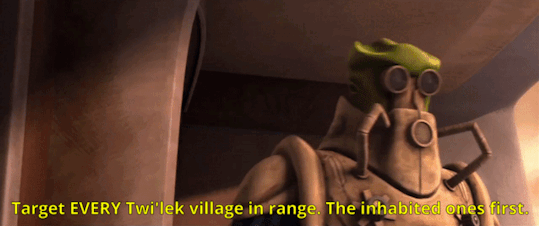
... and instead of lifeless droids, he prepares for the Jedi an army of men... living, mortal people who, despite being well-trained, will be completely out of their league when facing the likes of Dooku...

... Ventress...
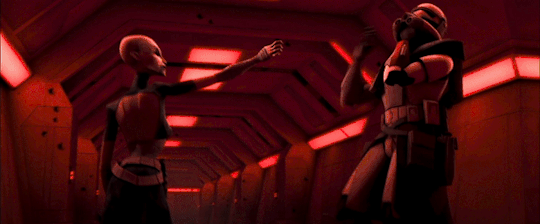
... Grievous...
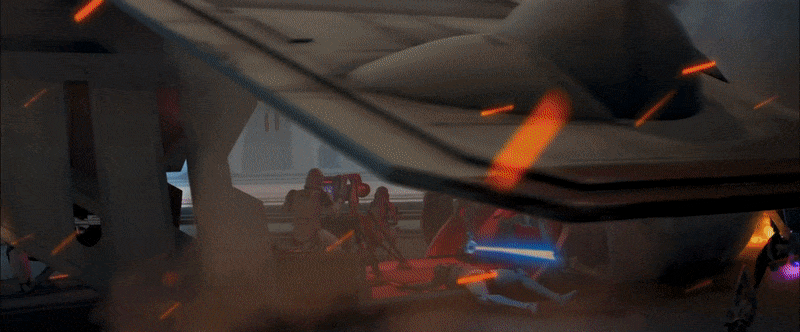
... Savage Opress...
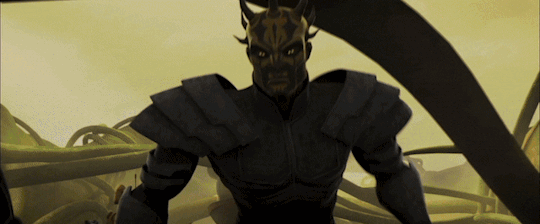
... or the defoliator, a tank that annihilates organic matter.
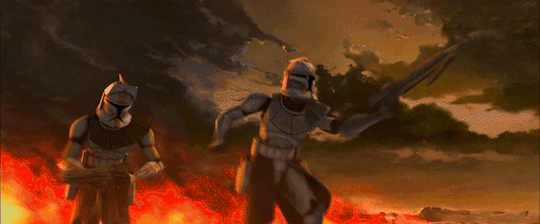
Thus, in order to save as many clone and civilian lives, the Jedi join the fray despite knowing that doing so will corrupt their values.
And as the war rages on, a bond of respect is formed between the two groups.
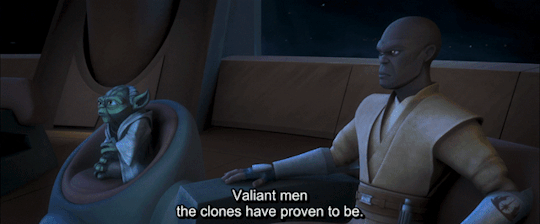
Clearly, the Jedi don't like the fact that the Republic is using the clones to fight a war, but for that matter, they don't like being in a war, in fact they advocated against it.

However, it's happening regardless of their issues with the idea or personal philosophies. Said The Clone Wars writer Henry Gilroy:
"I’d rather not get into the Jedi’s philosophical issues about an army of living beings created to fight, but the Jedi are in a tough spot themselves, being peacekeepers turned warriors trying to save the Republic."
And bear in mind, the Jedi are basically space psychics, the clones are living beings that they can individually feel in the Force...
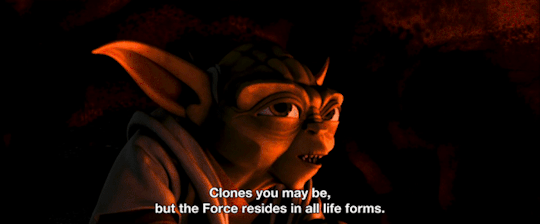
... so the Jedi feel every death but need to move on, regardless, only being able to mourn the troopers at the end of every battle.
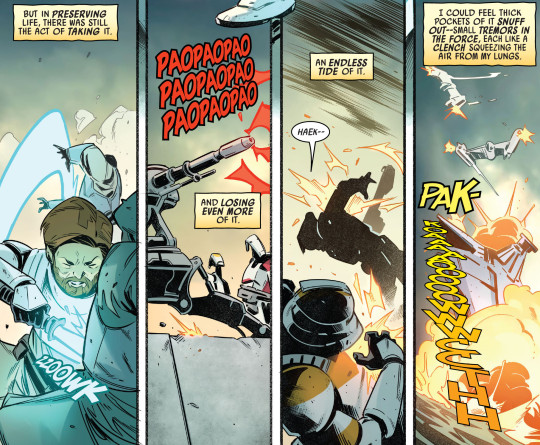
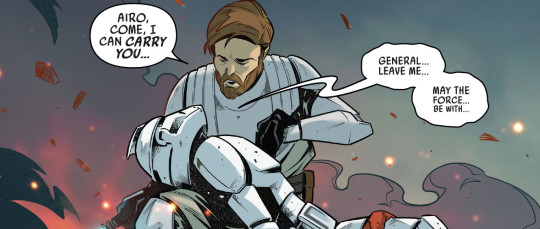
We see this in the Legends continuity too, by the way.
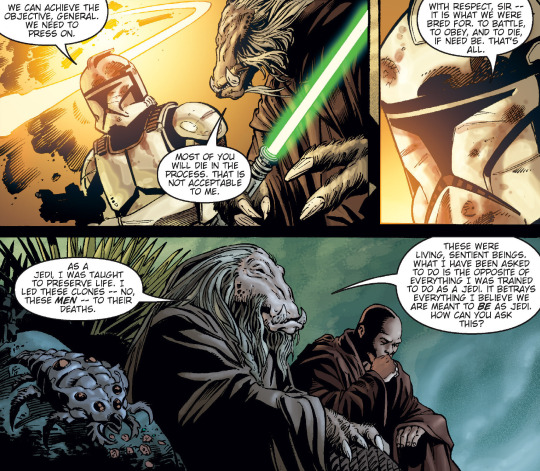
(that is, when the writers actually try to engage with the narrative)
Also, if you ask the clones, they’re grateful the Jedi have their backs.
When Depa Billaba voices her concerns about how the war is impacting the Jedi's principles, troopers Grey and Styles are quick to make it clear how grateful they all are for the Jedi's involvement:
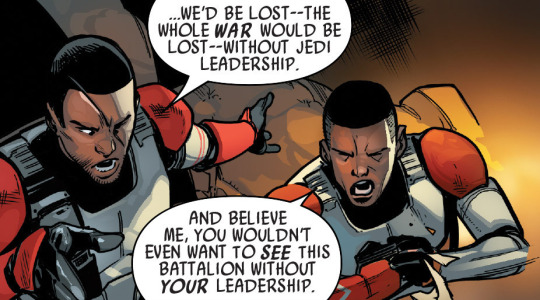
So the clones aren't the Jedi's slaves. If anything, they're both slaves of the Republic (considering how low the Jedi's status actually is in the hierarchy).
Only I'd argue the clones have it much, much worse.
The Senate sees the Jedi as "ugh, the holier-than-thou space-monk lapdogs who work for us"... but a Jedi has the option to give up that responsibility. They can leave the Order, no fuss or stigma.
A clone trooper cannot leave the GAR! If they do, they’re marked for treason and execution. Again, they’re not perceived as “people”.
And it doesn’t help that the Kaminoans, the clones’ very creators, see the troopers as products/units/merchandise. A notion that the Jedi are quick to correct whenever they get the chance.


How The Clone Wars writers describe the clones' relationship with the Jedi.
George Lucas hasn’t spoken much about this subject aside from the quote from further up. But to be fair... the Prequels aren’t about the clones’ dynamic with the Jedi, so it makes sense that he wouldn’t talk on that subject so much.
He did mention that part of The Clone Wars’ perks is that he could:
“Do stories about some of the individual clones and get to know them.”
But that’s as far as it gets.
So for this part, I'm just gonna let Dave Filoni, showrunner of The Clone Wars and the upcoming series Ahsoka, and TCW writer Henry Gilroy - both of whom worked closely with Lucas - take the wheel. They make themselves pretty clear on how the clone/Jedi dynamic is meant to be viewed.
Here’s Henry Gilroy:
"In my mind, the Jedi see the clones as individuals, living beings that have the same right to life as any other being, but understand that they have a job to do."

"The clones see the Jedi as their commanding officers on one hand, but also, at least subconsciously, they look to them for clues to social/moral behavior."
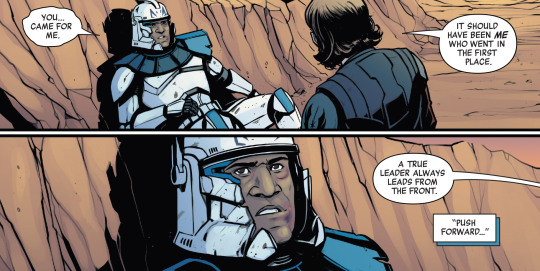
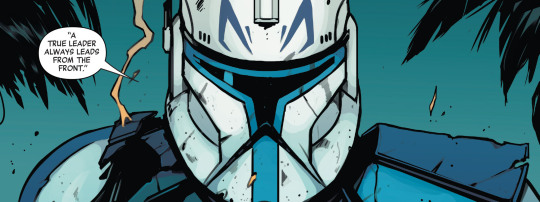
"Some clones may find themselves getting philosophical leadership from the Jedi that helps them answer some of the deeper questions of life."
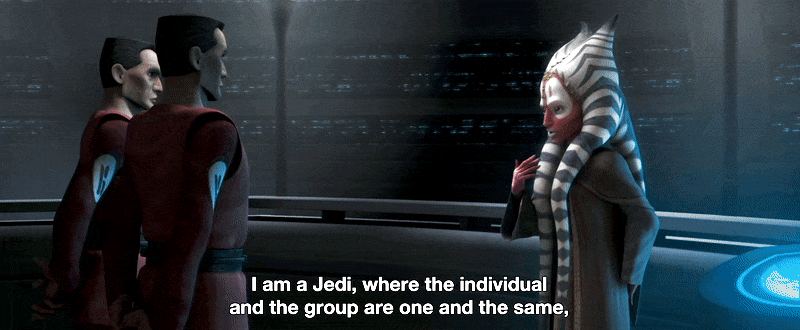
"We thought this was a great opportunity to show how the Jedi interact with clones. Specifically, Yoda in a teaching role of the clones, who were socially new, who kind of grew up— who were created to fight, and he really broadened their horizons and helped them realize there was a great big universe out there that was bigger than just fighting and killing."

And here’s Dave Filoni’s comments:
"I truly believe that the Jedi try to humanize their clones and make them more individual, as Henry says."
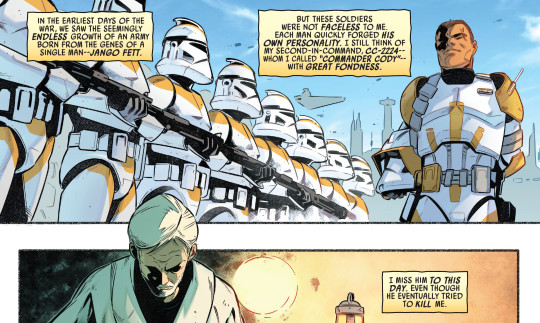
"I think we saw that in Revenge of the Sith, when the Clones were colorful and named under the Jedi Generals, and then in the final shots of the film with Palpatine and Vader near the new Death Star, the ships are grey, the color and life is sucked out. The Stormtroopers are only numbers and identified by black and white armor or uniforms in A New Hope."
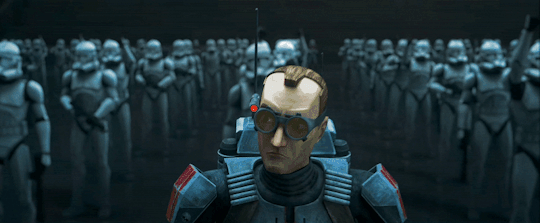
"The soldiers have become disposable to the Emperor."
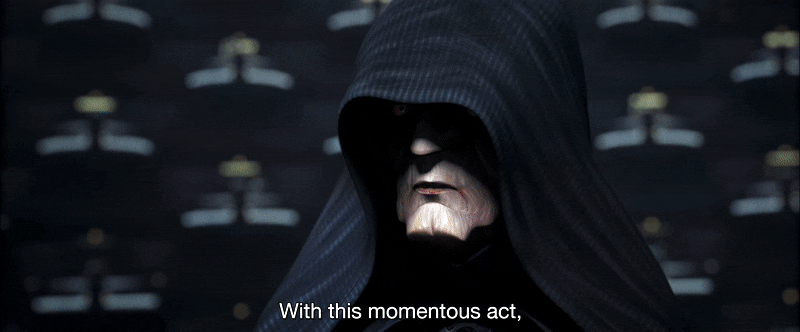
"That is something the Jedi would never do."
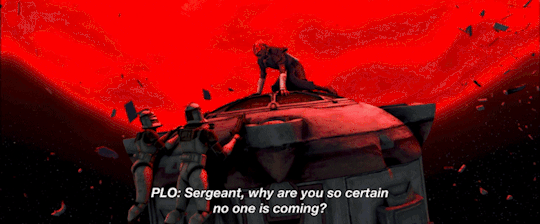
"Yoda teaching the clones much like he taught Luke. ‘Cause that was kind of natural for [the Jedi], a natural instinct to take to these clones like they’re students."
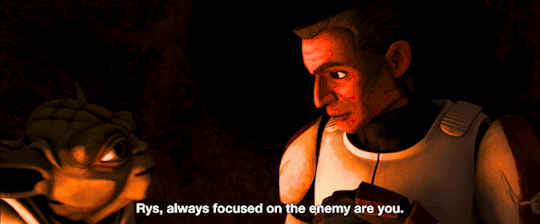
None of the above quotes from two different writers of The Clone Wars, who had many interactions with George Lucas, frame the Jedi and the clones’ relationship in a negative way.
How much more proof do we need that "the clones were slaves of the Jedi” isn’t the intended narrative?

My point being that while the clones' ordeal is indeed horrible, the Jedi have nothing to do with it. The narrative of The Clone Wars always frames it as the fault of the Sith, the Senate and the Kaminoans.
If you go by the intended narrative, the Jedi were the clones' teachers and brothers-in-arms. The clones and the Jedi were not just comrades.

They were friends.
#long post#But most of this is GIFs used for evidence#meta#SW meta#jedi#Jedi Order#in defense of the jedi#Clones#The Clone Wars#on the jedi's involvement in the clone wars#TCW#Clone Troopers#Rex#Cody#Plo Koon#Mace Windu#Obi-Wan#Yoda#Dave Filoni#Henry Gilroy#Grogu#George Lucas#flashing gif
2K notes
·
View notes
Text
There’s something so heartbreaking about a forty-something year old Ahsoka, who is now a jaded and traumatized war-torn survivor of a genocide, who has refused multiple opportunities to take on a Padawan (something that she probably looked forward to when she was younger), who lives a hermit-like life in her own ship with nobody except a droid for company when she used to live in a Tenple full of Masters and Younglings, who has left behind the only set of people that she became close to after the War, who seldom smiles despite the fact that she used to laugh and crack jokes all the time, who is still being held back by her fear of commitment and the impossible burden of responsibility and her unresolved feelings regarding her old Master…
And then seeing her face light up with a childish joy when she hears what sounds like Anakin’s voice behind her. Because all of a sudden, Master is here. Her big brother is back. Everything’s going to be okay again, isn’t it?
Isn’t it?
1K notes
·
View notes
Text
I think about it a lot, how the name of Spectres is incredibly fitting for the rebels of Lothal. Each is a ghost, and each is haunted by one, or many.
The ghost of the Jedi Order haunts Kanan Jarrus. He is one of their last relics: a symbol of a forgotten creed and age. He tries his best to pass his teachings on to his own padawan, but deep down he knows that the traditions of the Order will die with him. He tried not to let it bother him. Sometimes in the corner of his eye, he will see a tall woman in brown robes, smiling gently at him.
The ghost of her mother, Eleni, haunts Hera Syndulla. To look at herself in the mirror is to look at the face of her beloved ryma. Hera possesses the fire and iron will of Eleni, the very will that followed her to her end. Sometimes, when Cham Syndulla reads the headlines of Imperial newspapers, decrying a new terrorist cell known as the Spectres, he will think of the woman he loved, and how she lives strong in their daughter.
The old C1-10P unit known as Chopper is the ghost of the Republic; not the Jedi, nor the Sith, but the everyday soldier who took up arms for their galaxy, soldiers who could not know the full breadth of evil that threatened them. Chopper does not sleep, but on occasion, his memory core will play back a scene of a burning ship, and the scream of the pilot behind him.
The ghost of his people haunts Garazeb Orrelios. He is the last of his kind, completely alone in a galaxy of quadrillions. His people follow him in the words no one understands but him, in the weapon he wields that has been passed down through generations, in the small traditions only he observes, if only to remind himself that he is still a Lasat. In the golden light of a star cluster, some of those ghosts are put to a much deserved rest; the rest follow onwards in quiet reverence.
The ghost of her family haunts Sabine Wren. To her clan she is dead, and to her, her family is dead as well. Though the mere thought of them makes her chest ache with want, she stands strong in her solitude. Mandalore still throbs within her in every shot from a blaster, in every stroke of a paintbrush, in every explosion that paints the night sky with fire. When she is alone, though, the face of her beloved brother, the voice of her father, the warm touch of her mother will keep her company.
The ghost of Mira and Ephraim Bridger, and the planet they call home haunt their son, Ezra. As he grows old in a distant galaxy, Ezra Bridger has no trouble remembering his fathers face, for it had become his. In every step, in every breath, he radiates the howling of wolves, the chitter of cats, the towering spires of rock, the natural music of Lothal. He is driven by his ghosts; two of them are laid to gentle sleep in the fluttering fury of fyrnocks wings, the other in the pulsing glow of purrgils.
The ghosts of his brothers, even those who did not die in battle, follow former trooper CT-7567, better known as Rex. He sees them in the weathered faces of those who did survive, in a cloudy handprint on a wall, in the clocks as they strike five, in the symbol of the republic he fought and failed to protect. He is both a paragon of the endless cruelty of the fallen republic, and the gentle humanity of the long gone Jedi.
The ghost of a unit of boys on Onderon, barely old enough to know they had been sent to die, follow Alexsandr Kallus. He is the whisper of misplaced, frantic hope that things could become better if he only tried hard enough, if he only pushed himself further. His ghosts only appear to him in his dreams, beyond the veil of smoke and fire and screams, where he is not strong enough to push them aside.
In each there is a ghost, and in each a ghost follows them, shaping their world, driving their choices, changing their fate.
#Look lads!#I finally posted it!#star wars rebels#swr#sw rebels#star wars#kanan jarrus#hera syndulla#chopper star wars#garazeb orrelios#zeb orrelios#sabine wren#ezra bridger#captain rex#commander rex#agent kallus#alexsandr kallus#meta analysis
595 notes
·
View notes
Text
You're shipping Crosshair and Ventress because he offered her his hand.
I'm shipping Crosshair and Ventress because she beat the shit out of him in hand-to-hand combat.
We are not the same.
#this is a joke#I think#I'll get back to you when the Ao3 posts start dropping#the bad batch#tbb crosshair#asajj ventress#tbb spoilers#the bad batch spoilers#sw tbb#the bad batch season 3#tbb season 3#the bad batch season 3 spoilers#tbb season 3 spoilers#tbb meta#tbb shitposting#the bad batch shitposting#this is not quality content#tbb s3e9#The Harbringer#ADH-D2's Patented Bullshit
363 notes
·
View notes
Text
"You think you can take whatever you want. Things you didn’t make, didn’t earn, things you don’t understand." The story of an indigenous boy fighting against a colonizer to get his home back. A teenager telling the man who is destroying his world that because it is so much more complex and important than what he sees, he will never get to have it.
Ezra's story is about connection, with all living beings: loth cats and wolves, purrgils, people, etc. And it ends with nature reclaiming what has always been its from the machine that is the Empire. It ends with the people getting their home back from the people who occupied it
And here's the thing: Ezra doesn't know a galaxy without the influence of the Empire. The history of the Old Republic, the tales of the Jedi, they're all fairytales to him. Yet he still fights for it; he fights for something he hasn't yet seen, fights for what's right, for his people and his family. He fights for freedom even if he doesn't know what it feels like
And it's this determination, this endless hope, that drives others to do the same as him. He, with only his words, is able to make things different. It challenges the whole "I'm just one person, I won't change anything" belief. Because Ezra is just one person, and one person can't do much on their own; the war is lost if it's only you fighting it
But Ezra frees Lothal. Ezra banishes Thrawn. Ezra inspires others to fight back. Ezra's sacrifice was not meaningless, and it will always be remembered. He will always be remembered
#rebels is about so many people going “i'm only one person. but even if i'm just one i can still make a change. i can help”#the rebellion is full of people that believe that even if they're outnumbered they can still spread their message: they can still be free#from the empire and everything it represents#they believe that the fight is not over. that as long as theres hope someone will continue to believe in freedom#and they're right#oh they are so right#“i'm just one person. i can't do anything to help” even one person can make a difference#you can do it. it's not just you; we're all with you#star wars#star wars rebels#swr#sw rebels#sw meta#star wars meta#ezra bridger#lothal#grand admiral thrawn#avis' post
195 notes
·
View notes
Text
Something about how Hera loves deeply but is afraid to name it. How she lost her mother young and watched her father become someone unrecognisable, felt and witnessed the consequences of loving and losing. How her father's love became conditional and she had to choose herself. How she encounters an escaped Jedi and sees both the frightened boy he is and his quiet strength, and loves him so easily it frightens her. How she sees that same frightened boy in Ezra and immediately takes him in as a son. How her love is best expressed through action, modelling leadership and equipping those around her with the skills they need, so they are more likely to return home. How she loses Rebel pilots daily in the struggle against the Empire, and Kanan has to remind her often to trust that their kids can fend for themselves. How her commitment to freedom is so complete that she could lose herself in the fight for it, so long as she doesn’t lose the ones she loves. How she is only brave enough to let go fear and name the depth of her feelings for Kanan just before she loses him.
#this is a hera syndulla appreciation post#hera syndulla#kanera#the ghost crew#star wars rebels#kanan jarrus#sw rebels#sw rebels meta#galaxy star wars
208 notes
·
View notes
Text
I've said all of this stuff already but I'm pissed rn and it's therapeutic to type it out:
Maul's presence on Mandalore in TCW s7 is NOT a priority. The political situation on Mandalore, while shitty, has been the same for the civilian population since s5, with or without Maul there. Things can wait a bit.
Sure, capturing Maul is possibly time sensitive (since they don't know how long he'll be on-planet), but taking back Mandalore isn't. If Maul leaves before they show up the planet is just as easy to take. Bo-Katan is using his presence as an incentive because she doesn't have the necessary forces to win, whether or not he's there. The situation is only urgent for her because if Maul leaves then the Republic has no reason to help her cause. The situation is not urgent for Mandalore because, again, it's been the same for basically a year - Maul's presence has little impact on the people, his forces are the problem and they have never left.
The Republic didn't "refuse" to help after s5, they just had no more reason to. Almec is still legitimately Prime Minister (accepted by the people) and Mandalore is an independent sovereign system that has spent actual years refusing outside interference. The second Maul bails "helping" goes back to being called "invading".
Capturing Maul is also not even a priority to the Republic (Republic =/= Jedi Order) because Palpatine ordered the Jedi to stop bothering with him in s5. Officially Maul is 'just' a crime lord, and he's not allied with the Separatists or even attacking the Republic. It's well established in TCW that the Jedi don't have the manpower to deal with the underworld anymore. What's the point of dismantling black markets and crime rings if the planet gets bombed into oblivion the next day? Priorities.
The Jedi can't do what they want with Republic resources. As awful as it is, the Clones belong to the Republic. The Jedi can be ordered to pull out of a situation whenever the Senate pleases. (see above)
Capturing Maul (what would be the Jedi's goal going to Mandalore) would really best be accomplished somewhere he doesn't have all his forces backing him up (again, confronting there is for Bo-Katan's benefit because her own goal isn't just to capture Maul but to beat his forces which she wants the Republic to do for her)
The Battle of Coruscant is ABSOLUTELY a pivotal point in the war and the main priority. The second the Separatists show up above the Republic's central seat of power? The political and military capital? The most densely populated planet in the Galaxy? It's time to drop literally everything else. The Senate is there. The Temple is there. A LOT of their troops are stationed there. There are hundreds of thousands of billions of people living there. Even pulling forces out of allied worlds to go help Coruscant wouldn't be a dick move, just a desperate one - nevermind waiting to send troops to a neutral-on-a-good-day-and-more-or-less-enemy-the-rest-of-the-time world.
The Jedi don't even refuse to help.
They don't.
Why am I typing all of this to defend their refusal to help? They don't refuse to help.
Obi-Wan wants to take a hot minute to THINK ABOUT the implications of going guns blazing into neutral sovereign territory to confront a dude who has an extremely personal vendetta against him and is known to set traps of precisely this kind. (And Obi-Wan is right to consider these things because HEY! IT IS A TRAP! MAUL SLAUGHTERS A BUNCH OF CLONES AS A BREADCRUMBS TRAIL TO LEAD SOMEONE HE HOPES TO BE OBI-WAN INTO A TRAP!)
Obi-Wan also answers to the rest of Council, just like every other Council member. Bo-Katan gets pissy that he's not giving an answer right that instant because SHE needs Maul to still be there, but thinking things through is literally Obi-Wan's job description.
And after all this, after the attack on Coruscant and the political considerations, THE JEDI DON'T EVEN REFUSE TO HELP.
The Mandalorian traditionalists' favorite pastime is attempting to kill Jedi. Not too long ago, Bo was right there when Pre was trying to kill Obi-Wan. And then trying to kill Ahsoka. And then allying with the Sith (who notoriously want to kill all the Jedi) on two separate occasions (Dooku and Maul). The Mandos PRIDE THEMSELVES on hating the Jedi. There has never been in canon an instance of a Prequels-era Mando warrior helping a Jedi out for altruistic motives.
Bo-Katan is appealing to the Order's decency (saying that her people suffer etc etc) but she doesn't even have the honesty to couch it as a real, desperate plea for help. Instead she presents the situation as transactional, as though she was bringing anything concrete onto the table. If the Republic comes in, takes Mandalore for her and captures Maul, she has contributed to the effort how, exactly? What has she given the Republic? How many people fight for her is left pretty vague but we really don't see that many of them. Plus it's her planet. Fighting for it isn't her giving the Republic anything, it's still her helping herself. And yet she gets incredibly pissed when Obi-Wan takes time to examine the 'deal.'
In light of the two previous arguments, the Jedi would in fact have been perfectly justified in telling Bo to eat some freaking humble pie.
THE JEDI. DON'T REFUSE. TO HELP.
Sure it's Obi-Wan specifically who okays the operation, before the rest of the Council can make a decision, but do they order the troops to pull out afterwards? Nope. Do they sanction him? Nope.
They do help.
They really shouldn't have let Bo-Katan in charge but hey, they get all massacred after that and the Republic's backing is literally what gives Bo-Katan legitimacy in the eyes of many clans for decades after (see the Protectors' position in Rebels. Her legitimacy stems from SATINE'S and the Republic apparently backing her up as Satine's heir. It's not from kicking Maul out.)
(I love Bo-Katan as a character but as a person she's. huh. a lot. She changed from outright villain to morally gray character because the villains got a lot worse not bc she got better lmo)
So the Jedi absolutely did help afgfdsdfgfdsdfd why are people getting pissy about Obi-Wan - who has a complicated history with Mandalore that involves a loved one getting murdered in front of his eyes by Maul - hesitating to help
They really didn't refuse to help.
They really had every reason to
It would have been perfectly reasonable in fact
Yeah they have a mandate to protect innocent people but there were a lot more innocent people on Coruscant
Innocent people who did want their help instead of yelling GTFO every time they showed up
Because the Mando civilians sure didn't want them there
Oh and also? They didn't refuse to help
#jedi order#tcw season 7#siege of mandalore#bo-katan kryze#darth maul#obi-wan kenobi#long post#meta#my meta#more like me ranting#sw talk#the great siege of mandalore diatribe
575 notes
·
View notes
Text
One thing that Stover does in the RotS novelization that gives me heartache is how he shows that both Obi-Wan and Padmé, the two people closest to Anakin, misunderstand him and how he works, specifically how and when he worries about things, with devestating consequences.
Anakin is so generally reckless and impetuous, it gives the impression that he lacks all caution and forethought. He doesn't seem to care about consequences and goes after what he wants. He just dives straight into things and is willing to risk his life to do what needs to be done for the people he loves.
This attitude would cause Obi-Wan and Padmé no end of worry about him, and bias them toward assuming he's like that all the time. This means they both don't fully understand the danger that he's in.. from himself.
There are two passages that are pretty close mirrors to each other. The first is Padmé and Anakin discussing the baby:
She shook her head. "What are we going to do?"
"We're going to be happy, that's what we're going to do. And we're going to be together. All three of us.
"But-"
"No." He laid a gentle finger on her lips, smiling down at her. "No buts. No worries. You worry too much as it is."
"I have to," she said, smiling through the tears in her eyes. "Because you never worry at all."
This line is immediately followed by Anakin's nightmares, and the juxtaposition stark and clear. He does worry. He worries deeply about the future and keeping those he loves safe. He doesn't want Padmé to worry, because he wants her to be happy, so he internalized all the worry for himself.
That exchange is echoed only 22 pages later when Obi-Wan is warning Anakin about a strange meeting requested by the Chancellor, and so presumably the callback is intentionally flagged for the reader:
This is a dangerous time to be a Jedi. Please, Anakin—please be careful."
Anakin tried for his old rakish smile. "You worry too much."
"I have to–"
"—because I don't worry at all, right?" Anakin finished for him.
Obi-Wan's frown softened toward a smile. "How did you know I was going to say that?"
This reveals that Anakin assumes that Obi-Wan is going to offer the same caution as Padmé, almost containing on a conversation like Obi-Wan is Padmé. They both are a figure that loves him and wants him to be safe. Obi-Wan confirms that he was going to say it, as though it's been said a hundred times, a long-standing point of contention.
Anakin then displays a level of self-awareness not often attributed to him.
"You're wrong, you know." Anakin stared off through the morning haze toward the shuttle, past the shuttle—toward 500 Republica, and Padmé's apartment.
He said, "I worry plenty."
Obi-Wan and Padmé both want Anakin to be more concerned about consequences and his own health and happiness—they want him to be responsible and measured in his choices, they want him to care about himself. They assume (wrongly) he cares about the galaxy at large, about collateral damage, because they think they know he has a good heart.
They just want him to worry a bit more about his own life and safety, so they would have to worry about him a bit less.
The problem with this is that Anakin is already distracted with worrying about getting what he wants, to the point of tunnel vision and lack of concern for collateral damage. He's very worried about keeping what he loves safe—the problem is not worrying, it's that his priorities are messed up and deeply selfish. Neither Obi-Wan nor Padmé really grasp this, and it makes them blind to what is about to happen.
Stover as always is an expert at twisting the knife. We the audience, helpless to interfere, see the wreck coming, we see Anakin's dimming light and waxing greed, but Obi-Wan and Padmé can't. They're shielding themselves from the truth, their vision warped by how much they love him, and it's all so deeply tragic.
#anakin skywalker#padmé amidala#obi-wan kenobi#rots novelization my beloved#thank you mr stover#sw meta#sw#long post
274 notes
·
View notes
Text
Do you ever think about Maul when he was first taken in by Palpatine. Do you think he was scared. Do you think he knew it was over before it had begun. Do you think he used to wait for someone to save him. Do you ever think about how he was just a little kid
#he was just a baby#i stand by the idea that (much like Every Other Sith) if he'd been saved early enough he would've been ok#also. i know in the plagueis novel he's taken in literally as an infat. but i think it adds layers if he was maybe a toddler ish#i've made posts like this before but DO YOU EVER THINK.#type: meta#fandom: star wars#star wars#sw#star wars prequels#maul star wars#darth maul#star wars maul#maul opress#palpatine#sheev palpatine#sw palpatine#palpatine star wars#star wars palpatine#sw sith#star wars sith#sith
71 notes
·
View notes
Text
Before I begin, I just wanna throw these out:
• “ ‘Missing out on love’ isn't something that matters as much when your society isn't amatonormative.”
• “When the world around you doesn't emphasize marriage and romance and all that, then wouldn't you view cultures that do as a tad odd? Not weird in a bad way, just different.”
• “[…] People cannot fathom the concept that other people might experience romantic attraction, and do so intensely, and yet value something else above romance.”
• You just don’t have those feelings of “I need romance, I need marriage” when your society isn’t broken by being amatonormativity. You just don’t have those feelings when you’re already fulfilled in a community. You just don’t have those feelings when you have a purpose in life.
• “Call me crazy, but I know for a fact that I would not want a romantic relationship if I was a Jedi […] […] […] I honestly don't understand the assumption that ‘the Jedi are miserable because they can't get married,’ I really don't.”
• There’s romance and marriage in every single media and literature, so why should it be inserted into a fictional monastic culture? If you don’t think entire groups of people could choose to have no romantic commitments their entire life, then there’s over a thousand-year nonfictional accounts of monks and nuns and priests choosing to live a single life in an environment that, too, forbids them from romantic commitments, and they lived in contentment and peace.
————————————————
I wanted to show all that first, like a little preview, because this post is not only about why the Jedi are not wrong for disallowing romantic commitments and marriage, but it’s also about amatonormativity which has always been an enormous problem in the real world, and it clearly impacts how people view communities like the Jedi within fiction.
———
“So why can't Jedi marry? The Jedi believe that children and spouses deserve complete attention. They believe that people deserve present parents and involved partners. Being a Jedi isn't a job. It's a lifestyle. How dare they preach compassion and fairness and justice whilst leaving some abandoned child somewhere? How dare they teach kindness and love and self sacrifice while having a neglected spouse?” — @popupguidetothegalaxy (original post here)
This right here! It wouldn’t stop the criticisms within that part of the fandom, it’d just redirect it to a different one.
Even if the Jedi did marry and have families, y’all (Jedi antis) would then criticize the Jedi for prioritizing the galaxy (which is literally their vocation, their aspiration, and their lifestyle) over their spouses and children.
On top of their daily galactic duties that « take them away from the temple on assignments or missions, away from the planet that temple is located on, and always on the move interstellar-wise » ,,, antis think the Jedi should/could be able to marry and raise a family properly with zero neglect of either spouse and child?
Forget about being burnt out like a nurse in a severely understaffed hospital, it’s just simply an impossible commitment!
———
I watched “Tiger Cruise” rather recently, because it’s one of those Disney movies I never watched growing up, and one conversation in the movie puts this into even more perspective – because the teenaged main character is sick & tired of always only seeing her Navy commander father for a few weeks every few months, begging him to quit the Navy and come home for good.
Maddie: Dad, when are you coming home?
Commander Dolan: What do you mean? We're gonna be docking on Friday.
Maddie: No, I mean… When are you coming home for good?
Commander Dolan: Is that why you came on board? To ask me that? [pause] Look, this is my job.
Maddie: Then get a new one. You've got the degrees, you can do like anything you want.
Commander Dolan: This is what I do.
Maddie: [pause] Must be nice .. travel all over the world, no responsibilities.
Commander Dolan: I'm responsible to a lot of people.
Maddie: To strangers, Dad. What about us? [pause] We’re strangers too. We move all over the place, see you for a few weeks every four or five months, or whenever the Navy says it's okay.
Commander Dolan: The Navy is a way of life. I mean, you go into it and you know the sacrifices you have to make.
Maddie: Well, you’ve done it for my entire life.
Seriously, is this what Jedi antis want? It’s misery, and not necessarily on the parent’s part — he’s HAPPY and LOVES his job. He has the degrees to do anything he wants, as Maddie pointed out, but he doesn’t leave the Navy. It’s the same with the Jedi, as they have the best education and biggest library in the galaxies. And yet…
(some Jedi-Critical) and Anti-Jedi fans think the Jedi are miserable and why the Order is “wrong” for disallowing it [which is just projecting their subjective view of “what a fulfilling life is supposed to look like” onto a monastic people who value and find fulfillment in something other than romance], but it would actually be miserable if they did have families.
Pushing aside the fact that the Jedi are a monastic (and not only martial) organization, there’s a legit reason for disallowing marriage and committed relationships. It’s not fun and games. You can’t combine two enormous commitments and think you can handle it without neglecting the other. There’s no such thing as a part-time Jedi, it’s not a job title!

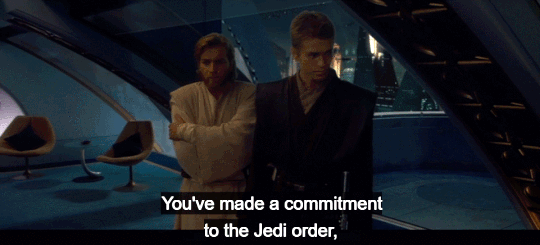
Jedi are able to leave the Order peacefully, they aren’t forced to stay, but on this specific topic, you just don’t have those feelings of « I need romance, I need marriage » when your society isn’t broken by being amatonormativity. You just don’t have those feelings when you’re already fulfilled in a community. You just don’t have those feelings when you have a purpose in life.
How dare they be happy and fulfilled by being Jedi? How dare they show their commitment to the Order by making the active and daily choice to be Jedi, when they could leave any time? How dare they stick their middle finger up at the no-romance/no-marriage rule? How dare the Jedi not conform to the “education → graduation → relationship → engagement → wedding → 2 kids and a dog” trajectory that only an amatonormative society expects of you? How dare the Jedi be monastic and live like it too?
———
(Words belong to @phoenixyfriend)
• “ ‘Missing out on love’ isn't something that matters as much when your society isn't amatonormative”
• “When your culture is one that emphasizes compassion for all [...] Don't you think that people might just not think of marriage as something worth striving for?”
• “When the world around you doesn't emphasize marriage and romance and all that, then wouldn't you view cultures that do as a tad odd? Not weird in a bad way, just different.”
I just keep thinking about the real world and how so much of the obsession with marriage and so on is a sociocultural thing. You don't want a big white dress because it's a big white dress: you want it because it is the symbol that your culture has been pushing on you since you were two. Girls are taught to fantasize about weddings and marriage and to like A Certain Look for it, sometimes to such a degree that they can spend decades in denial about things like their sexualities.
And we're unlearning that as a society, people are being more critical of the institution and how they engage with it, are starting to question what it is that our media teaches us, asking 'why is marriage the most important thing in a girl's life, or in anyone's life' and generally moving towards a world where marriage exists but is not treated as a universal life goal.
But the Jedi are just. Already doing that.”
• “Marriage is not an inherent human/sapient want. Companionship is! We are biologically wired to be social creatures! […] But marriage? A signed sheet of paper? That's not...inherent. Fidelity and monamory? Sure, maybe. Plenty of species mate for life. But... humans have been proving that's a choice for most of history.”
— (original post, here)
Even without the galactic scale of their lifestyle and duties, is it really so hard to understand or believe that people wouldn’t be miserable in a society where romance is not considered an important thing at all?
If you don’t think entire groups of people could choose to have no romantic commitments their entire life, then there’s over a thousand-years history of monks and nuns choosing to live a single life in an environment that, too, forbids them from romantic commitments, and they lived in contentment and peace.
They’re not only connected to other Jedi through the Force, they are connected to the rest of the universe through the Force; they find joy in their selflessness, in helping people, in trying their best to do good in a universe permeated with corruption. They love being a Jedi, there’s nothing a romantic relationship can give them that’s as fulfilling as being Jedi.
Just…stop projecting your amatonormative misery onto the Jedi.
———
If millions of people around the world in real-life can choose not to ever get married and have children (without even being a part of a close-knit community like the Jedi), despite being bombarded with amatonormativity in media and literature almost everyday, then what’s so weird about a fictional group (who are literally warrior-monks and whom have all of their companionship needs met within their non-amatonormative community) choosing to be single in favor of a higher calling and lifestyle that’s far more valuable and fulfilling than having a romantic relationship?
———
(Words belong to @jedi-enthusiast)
• “Call me crazy, but I know for a fact that I would not want a romantic relationship if I was a Jedi.
If I lived somewhere where I was a part of a community of people that I considered my mentors, my friends, my family; if I lived somewhere where I was encouraged to learn, to travel, to help people, to enjoy life as it is, and better myself; if I lived somewhere where I was supported and loved and cared for by the community, and I did the supporting, the loving, the caring for other people in the community as well; if I lived somewhere where it wasn't constantly implied, or sometimes outright stated, that my worth was tied to me marrying a man, popping out children, and making money...
...if I was a Jedi, I can honestly say that the thought of pursuing a romantic relationship probably wouldn't cross my mind at all---not unless I met someone specific whom I felt that sort of connection with, but even then, I probably wouldn't give up being a Jedi to be with them because I'd feel more fulfilled as a Jedi than I would in a romantic relationship.
I honestly don't understand the assumption that the Jedi are miserable because they can't get married, I really don't.
If you feel like you wouldn't be able to be fulfilled without a romantic partner, then that's fine! Everyone's different! We all have different wants and needs! But just accept that you wouldn't be fulfilled without a romantic relationship and stop acting like it's impossible for anyone else to feel differently.
The Jedi all seem perfectly happy as they are.”
— (original post, here)
I also wanna add, because I don’t know where to put this statement … there’s romance and marriage in every single media and literature, so why should it be inserted into a fictional monastic culture? They’re not only warriors, they’re monks too.
It’s a rhetorical question…but I think either they’re so marriage-obsessed that they hadn’t thought of this. Or they are consciously aware of the over-saturation of romance within media when they talk about how the Jedi Order are wrong for disallowing romantic relationships, but they don’t care because they think higher callings are stupid and anything else is inferior to a romance/marriage.
———
(Words belong to @tookas-have-teeth) (original post here)
• “There is a difference between people saying that everyone feels romantic attraction and that it is necessary to being human [arophobia] and the comments a lot of people make about the Jedi.
Oftentimes, when I see complaints about the Jedi, it's because people are angry that people who DO feel romantic attraction might not choose to act on it, or might be part of an organization that requires its members to give up romantic relationships and marriage. People cannot fathom the concept that other people might experience romantic attraction, and do so intensely, and yet value something else above romance.
People consider this to be a cruel denial and repression of one's feelings, rather than seeing it as a choice people are making to prioritize things they value. People have SO bought into the idea that romance is the Ultimate Form of Love, that romance is necessary to live a fulfilled life, that they cannot imagine folks finding other forms of love more fulfilling, especially if those folks experience romantic attraction.”
—
[a comment within the post linked immediately above] “By claiming that people who experience romantic attraction *must* act on it or else they are oppressed, one is functionally insulting every priest, monk, nun, or any number of members of a religious order who choose, of their own free will, not to pursue romance in favor of a higher calling.” — @supersaiyanjedi14
———
There’s only two other fictional worlds that I can think of off the top of my head, that are non-amatonormative. Blissfully fulfilled and happy …
… Equestria (My Little Pony) and Pixie Hollow (Disney Fairies).
After learning the word, I could now put a name to why these two worlds are my top favorites: It’s a non-amatonormative society where everyone’s happy with just a community and a purpose in their life, where romance is 100% not an important factor.
“But in Pixie Hollow, there’s no reproduction, so of course there wouldn’t be any relationships.”
There’s still love and attraction.
Rosetta gets a crush on Sled in Secret of the Wings, Queen Clarion and Lord Milori reveal they fell in love in the distant past. And Terrence has a crush on TinkerBell (although that might just be the printed media, ‘cause I don’t remember it being obvious in the movies).
Is it really so hard to understand or believe that in a society where romance is not considered an important thing at all, and people have (literal) power and a job that they love and a whole damn community for companionship, then those people wouldn’t be miserable?
So, again, stop projecting your allonormative and amatonormative misery onto the Jedi. ‘Cause that’s all it is: your projection.
It’s so sad that the real world can’t be like the aforementioned worlds. Our world makes it so hard for people; a majority don’t have jobs they love, or they don’t have time or money to pursue and grow their talents, and there’s no true community among us. It’s literally dystopian, and we only see it as “this is normal, it’s real life” because we don’t know any other way. But that’s quite a different topic, so…
—
I just wanted to add these, unrelated to Star Wars and fandoms, to point out how destructive it [amatonormativity and allonormativity] is in the real world. ‘Cause I do see tweets on my timeline, from time to time, where a user will be torn over not having a relationship at a certain age or their life not following the ‘right’ trajectory.
[posts by people outside of the Star Wars fandom]
— @uncanny-tranny (original post here)
• Amatonormativity has destroyed so many people's understanding and acceptance of themselves, and it's heartbreaking.
Yes, it is normal to be in your 20s, 30s, or older and not have lost your virginity, had a first kiss, or a partner. It is normal to say that you aren't ready for those things, too! It is normal if your life doesn't follow the "college graduate -> engagement -> buying a home -> 2.5 kids and a dog" trajectory that so many people have idealized.
So many people associate maturity with losing your virginity, or having a first kiss, or a serious relationship, and I think that's a dangerous association. Maturity isn't gained through those things, and you don't have to have those experiences to be considered "mature" or "grown." It is not a bad thing to go at your pace. Nobody else can live your life but you. If you end up having those experiences, that's great! But it should be done because you want to experience them, not because you feel "broken" and "immature" without them.
— @/acegirleatscake on Twitter
• Allonormativity and amatonormativity normalizes ableism: the “you must be cold, sick, delusional” or “there’s something wrong with you” if you don’t have sexual or romantic attractions or don’t want those types of relationships. Being single is seen as “being unwell.”
@/0p4l3sc3nt for this one (below)
• […] single people are constantly questioned about the legitimacy of our happiness […] In an Amatonormative society, our romantic relationships will always have ulterior motives (often subconscious) – which arise from us being conditioned to see romantic relationships as the means to achieve personhood, happiness, and TRUE purpose.
———
Sincerely, everyone in the Anti-Jedi circle needs to go outside, touch grass, and reflect on it.
If our society wasn’t amatonormative (if there was no such thing as our idealization of romance and marriage, if romantic relationships weren’t seen as the most important thing at all in our society), then nobody would have an issue with the Jedi Order disallowing it — for many legit reasons, might I again remind you! Their reasons make so much sense, yet your amatonormativity floods in and turns your brain into worms.
• “Fiction doesn't necessarily map onto people's real life opinions, but the statements people make about this topic are often very broad "the Jedi are bad for forbidding marriage, because people NEED romance" type statements that definitely sound like they're general worldviews rather than just opinions on fictional characters.” — @tookas-have-teeth (again)
This post was left in my drafts from a month ago (early August 2023), but seeing the topic come up again just made me kinda snap; and I don’t want to just scream into the void, so I’m posting it.
And I don’t care how repetitive some of it is, because that was very intentional. They’re like little reminders, so you don’t miss the point and might actually reflect on it.
HAVE A GOOD DAY!
#star wars#amatonormativity#pro jedi#fictional monastic cultures do not need romance or marriage when every single media is non-monastic and oversaturated with romance#in defense of the jedi#long post#allonormativity#this was in my drafts but I’m taking it out ‘cause I’m just sick and tired of ppl acting like the Jedi are miserable over the Order’s rule#I’m taking it out because I’m just so sick and tired of ppl acting like the Jedi don’t make the active daily CHOICE to be a Jedi#I’m sick and tired of allonormative and amatonormative-minded ppl in the fandom#thank you George Lucas for creating the Jedi#sw meta#star wars meta#I wish our society could be more like Equestria and Pixie Hollow and the Jedi#Our society is a dystopia
152 notes
·
View notes
Text

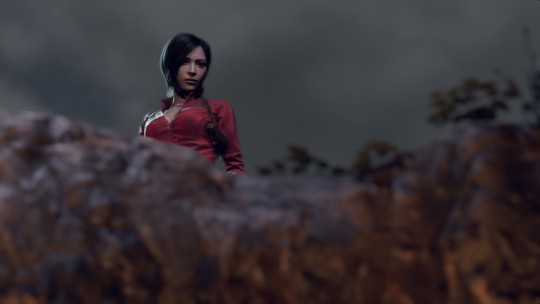

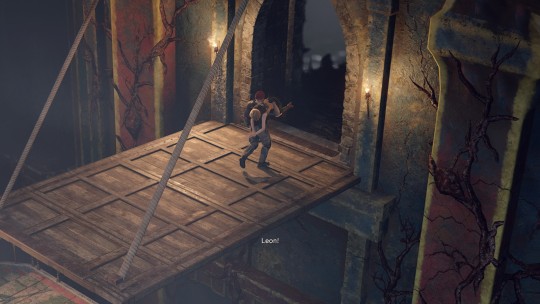
Up to this point in SW, Ada's exposure to Leon has been:
Seeing him during the village fight and then ringing the bell for him
Seeing him getting choked out by Mendez, then watching him stumble his ass over to the gate, unlock it, and head back towards the village
Luis's radio call to him at the start of his castle section
Their very first scene together in his campaign
The "babysitting's tough, huh?" conversation
Seeing him run over to a dying Luis
The "I guess you're not heartless" conversation
That's it.
So, let's explore Ada's feelings as she goes through Separate Ways with regards to Leon, Ashley, and herself.
The very first time Ada hears Leon's voice, it's him teasing Ashley with:
"I wanted to go home, but Ashley had to see this castle first."
The very first time Ada speaks to Leon herself, the first expression of emotion he shows is when she tells him to leave Ashley behind -- and it's anger at her.
The very first time Ada sees Ashley in person, it's this moment ^^^ in the shots.
This is what I mean by SW making the main campaign feel like "The Leon and Ashley Show" from Ada's perspective. Of those seven encounters, four of them have been about Ashley. In fact, the only conversations that Leon and Ada have had up to this point have been about Ashley.
And this happens over and over and over and over again. Ada can't seem to catch Leon at all without Ashley also being in the picture in some way. The boat scene is literally the only conversation they have or moment they share where Ashley doesn't come up at all.
This is what I mean when I say that SW feels like Ada's being forced to bear witness to what her relationship with Leon could have been in Raccoon City if only she'd been honest and genuine with him up front.
The point of having Ada listen in on the "Ashley had to see the castle" line was so that she became aware of what the relationship between Leon and Ashley was actually like. It isn't just business between them; it's warm and playful.
And Ada rejects that, at first. She outright denies it to herself. That's what's really at the heart of her telling Leon to leave Ashley behind -- because Ada, at first, almost doesn't confront Leon at all. She damn near leaves the room before he walks in, but then she thinks better of it at the very last second.
The full line of dialogue of:
"Leave the girl. She's lost no matter what. You walk away now, and who knows? Maybe you'll live to meet me again. And then I might get you that 'greeting' you were looking for."
immediately follows her openly hitting on him ("Not a bad move. Very smooth."), to which he has no reaction. And so she gets more explicit with him. Let's break it down:
"Leave Ashley. She's not important. If you leave her, you'll finally get to have me. That's what you really want, right?"
That's why her actual line isn't framed as a warning. She doesn't double down on it when Leon pushes back on it; her response is: "Right. How about we continue this discussion another time?" It's not about Ashley turning or not turning -- it's not about Leon saving her. It's about Ada offering herself and then feeling "what the fuck" about it when the offer is refused.
But she still denies it to herself. That's why her follow-up line of dialogue once she jumps out of the window is a very coy "See you around, Leon." She still isn't ready to accept that she's been replaced as the focus of his attention and affection -- hence the pettiness of her "Babysitting's tough, huh?" line.
Her attitude only starts to change after Luis's death -- when his dying wish is for her to help Leon. So, Ada puts her pettiness aside and switches from demeaning and belittling Ashley to referring to her as "your friend" instead. It shows a degree of respect while still removing the overt affection from the equation.
But then Krauser runs off with Ashley. Leon's anger boils over, and he shoots Salazar in the face. And now, Ada's reaction is:

But when she finds him right on her heels because he's that fucking pissed and that fucking determined to go after Krauser for Ashley's sake, it still catches her by surprise. It speaks to the depth of Leon's concern and affection for Ashley.
Once again, it reaffirms that Ashley's not just a mission objective to Leon. It's personal, for him.
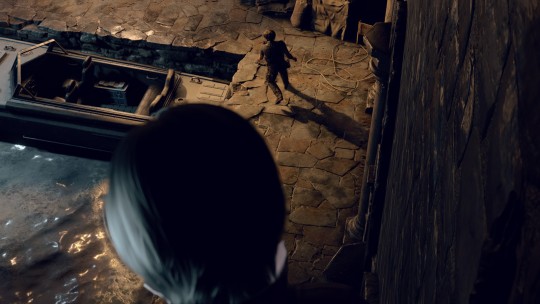
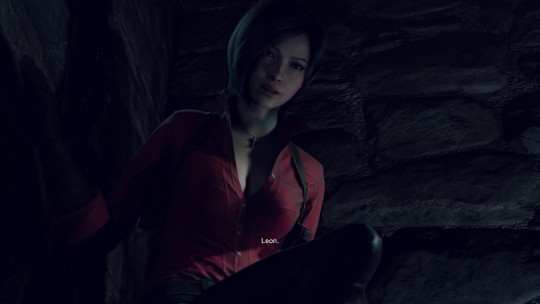
This leads directly into the boat scene, where Ada tells Leon that his greatest strength is still the love and compassion he has for other people...
... though it's not as if he hears her at all.

The next time Ada sees or hears from Leon, it's her walking in on the "for Luis" scene.
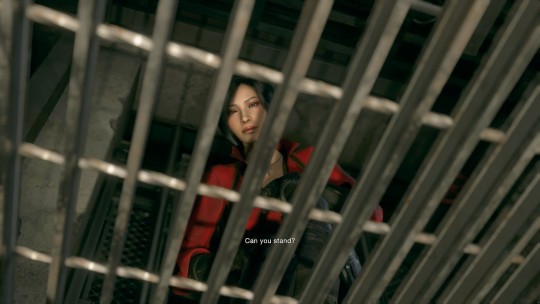
Even though Capcom went out of their way to make sure that Leon and Ashley didn't hold hands because they didn't want people to ship them, because, as we all know, holding hands is a universal sign of romance so that's exactly what they were talking about for sure and hi I'm twelve years old and I don't know how exaggerated anecdotes work what is this? anyway so Leon and Ashley hold hands in this scene even though that's not what Capcom wanted
I mean
Along with the pep talk scene, this is the most intimate scene in the game. Ada is intruding on a very private, vulnerable moment between Leon and Ashley that ends in a promise:
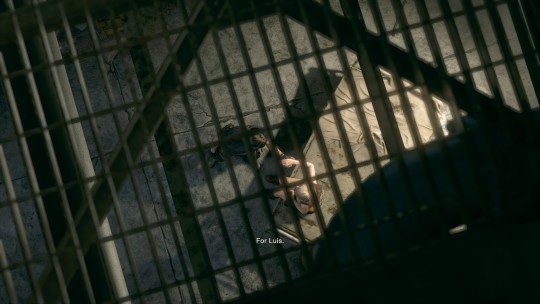
"For Luis."
This is Ada's affirmation that Luis wasn't jerking her around -- he was being genuine about wanting to help Leon and Ashley, and now they're committed to honoring his memory and granting him his dying wish.
And Ada's pettiness finally melts away -- at least, for a time. They have their way of honoring Luis, so now it's time for her to do it her way.


Suddenly, Leon and Ashley's closeness doesn't matter to her anymore -- because it's not about them, and it's not about her. It's about Luis.



Walking out of the comms facility, she hears Ashley successfully fighting off Saddler. Interesting framing here with the jet ski in the foreground.

But interestingly, Ada's focus doesn't fall to her.

There's actually not a single moment in this game where Ada says Ashley's name out loud. Ashley is either "her" or "the girl" or "the president's daughter." No matter how far she comes in this, Ada still can't let go of that last little bit of pettiness. It's still personal for her, and the only reason why Ada helps Ashley at all is because it also helps Leon, which in turn honors Luis.
So, she does do it.


But not for Ashley's sake.
And she isn't about to go out of her way, either.

And then we reach the apex of it all.
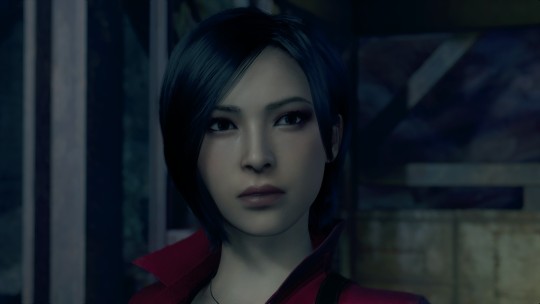
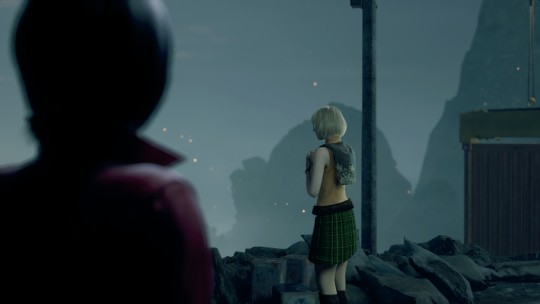
Ashley's watching Leon's fight with Saddler with her hands clasped against her chest as though in prayer, as embers float around her like fireflies. This is overtly romantic imagery. I've said this before but: this is so romantic in its imagery and symbolism that it's just straight up on the level of Final Fantasy nonsense.
And not only is Ada forced to reckon with that, but the first and only thing out of Ashley's mouth to her is an order. Not a request. Not a plea. An order.


And all Ada can say in return is:
"On it."
She's lost this fight.
Leon and Ashley (and Luis, to an extent) are a team, and Ada isn't part of that team. She sees it in this moment. Ashley is so comfortable in her place at Leon's side that Ada is a non-factor in the equation all together. That's why she wasn't in the lab with them. Ada acted as Luis's substitute, but in the lab, he was still with them.
"All of this -- removing the parasites -- this was Luis?"
"Yeah. We're alive thanks to him."
The matching scars that Leon and Ashley end up with as a result of their radiation surgery are different from the matching scars that Leon and Ada have.
Leon and Ada's scars are a symbol that they once carried the same consequences born of the same mistakes.
Leon and Ashley's scars are a symbol that they once carried each other.
And that’s a huge fucking difference.
Ada feels that difference in that moment.
There is no "Who was that woman, anyway?" "She's like a part of me I can't let go" in this version of the story, because Leon has long since let her go.
And so her pettiness comes back. At the very end, she shoots her final shot:
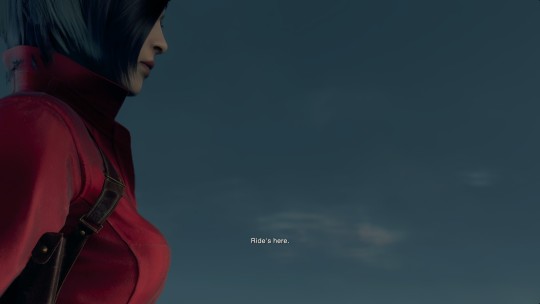
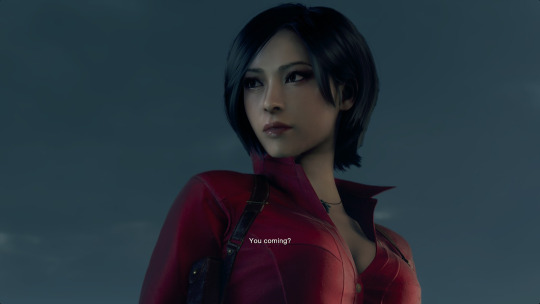
It's a bookend for and a direct callback to what we were talking about earlier:
"Leave the girl. She's lost no matter what. You walk away now, and who knows? Maybe you'll live to meet me again. And then I might get you that 'greeting' you were looking for."
which really meant:
"Leave Ashley. She's not important. If you leave her, you'll finally get to have me. That's what you really want, right?"
and led into:
"Right. How about we continue this discussion another time?"
She's ready to continue the discussion. One last ditch effort to see if all love is lost between them.
Leon's answer is very clear.


The Leon and Ashley Show isn't over, but Ada's role in it is.
Which leaves her to wonder who and what, exactly, she'll be the next time she and Leon meet now that her status as The Love Interest has been completely and utterly usurped.
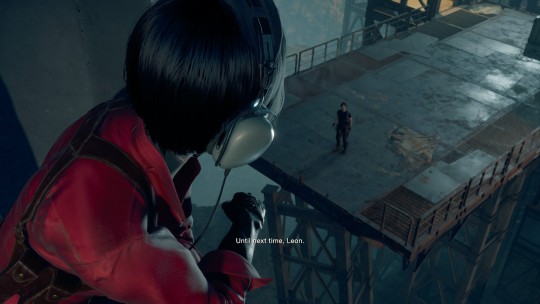
#resident evil 4#ada wong#leon kennedy#ashley graham#meta analysis#separate ways#consider this your quintessential 'SW confirmed that aeon is dead' post#i didn't even mean to do this#i just reached that scene in salazar's boss room and got a wild hair up my ass i guess
135 notes
·
View notes
Text
These are the only three flaws I will concede, when it comes to the Jedi during the Prequels.
“They got lax/complacent.”

Yeah*. If you listen to the director’s commentary, George Lucas states the scene in AOTC with Jocasta Nu is there to indicate how unprepared the Jedi were before the Sith’s plan. They thought they were secure and ready but they were not and it turns out humble restaurant owners like Dex know things they don't.
*HOWEVER:
Who wouldn’t be complacent, in times of peace?
The Sith were thought to be extinct and Dooku was once a Jedi, a revered one at that. Nobody could have suspected he’d betray the Order that raised him and loved him.
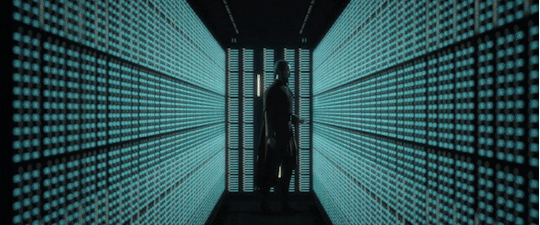
Nobody could've suspected that he'd abuse of their trust and delete a system from the Archives using the credentials of his best friend who he'd had assassinated. That's a verrrry specific scenario, and expecting them to be prepared for that is unreasonable.
"They should've sensed something!"
Well, by this point in time, everything surrounding the Jedi was tainted by the Dark Side, which clouded everything.
So on the one hand, this situation granted Sidious the gift of foresight and allowed them to always be one step ahead, and on the other, it caused the Jedi to be stuck trekking ahead in a fog, unsure of what the next move would be.

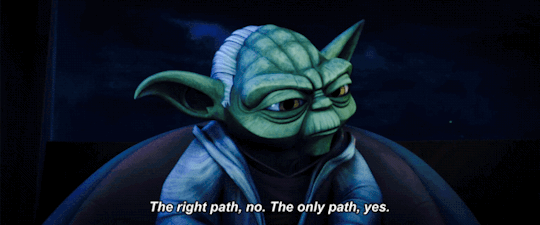

“They were politically-inept.”
Yes**. That’s how the Sith ran circles around the Jedi.
They figured “there’s only two of us, if we march into the Temple we’ll get slaughtered, but wait, the Jedi serve the Senate and the Senate is run by politicians… what if we become the politicians? Then we can destroy the Jedi and the principles from the inside!”
**HOWEVER:
The Jedi were politically-inept by choice.

After all, their function isn’t setting policy but carrying it out. They’re not politicians, they’re diplomats and as such they're not allowed to get involved in the political process.
But if they were... they still wouldn't. Because power corrupts, and if you let the space monks (who already have magical powers) have political power too, then that will lead to a very dark place.
The Jedi knew that if they tried to play politics, they’ll lose because they have neither the ruthlessness nor the status to do it well, so they make it a point of never going anywhere near it.
Unfortunately, that leaves them open to situations where the Senate or Palpatine corner them into doing something they really don’t wanna do.
It's how they were forced to expel Ahsoka, how they lost the favor of the citizens and it's how Dooku, then the Emperor, framed them as power-hungry sorcerers with his propaganda.
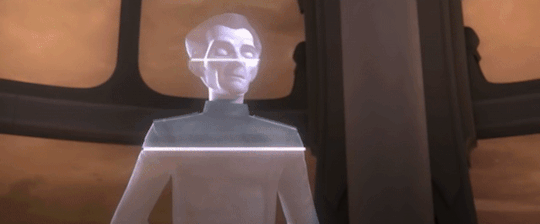



“The war made them hypocrites.”
Sure***. The Jedi were meant to be diplomats, not soldiers.
By waging war instead of keeping the peace, they’ve compromised on their values.
***HOWEVER:
The Jedi know this and they’re not happy about it at all.
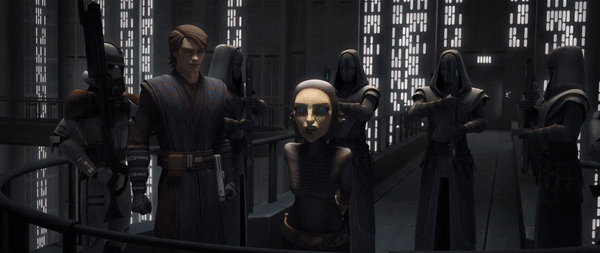
Firstly, because they were forced into this situation by the Senate and Palpatine, who drafted them into service.
Secondly, because they know they’re essentially moving ahead blindly and playing right into the Sith Lord’s hand by fighting this war he orchestrated.

But finally, it’s that they know that not joining would’ve been worse. Sticking by their principles would’ve resulted in the enslavement and genocide of many populations. Sometimes, the spirit of the rules must be prioritized over the letter. Either do nothing and be true to your principles, or go against them but save lives.
It’s a bad choice to make, but not as bad as not making one.
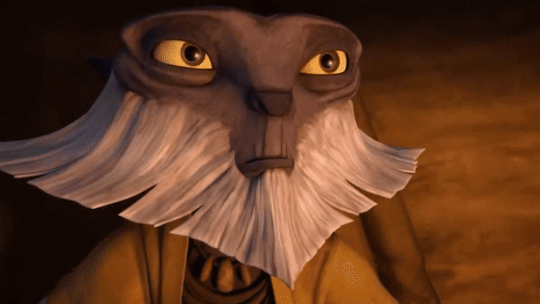

It's a bad choice, but it's motivated by a desire to do some good and it did. They saved countless lives (sometimes at the cost of their own) and inspired countless more to form the Rebellion, later on.

So... three flaws.
But they all come with asterisks. There’s a reasonable (sometimes, even admirable) justification for each of them.
I’m pointing these out because a lot of people seem to conflate “the Jedi were flawed” with “the Jedi were at fault” when talking about their own demise. And the answer to that is:
No.
The Jedi were not at fault. Everybody else was.
The Senate was at fault for growing corrupt and self-serving.
Big Corp for their never ending greed.
The Separatists for being so blind and naive as to think Big Corp would tooootally value their principles and absolutely not commit war crimes every chance they get.
The Sith for being the mass-murdering egotistical assholes who started this whole mess.
And the citizens of the galaxy for not taking up arms in the face of blatant injustice.

Sometimes bad people win.
That doesn't always mean the good guys are at fault. Sometimes, the bad guys are just… better at the game. Mostly because they see it as a game, and the good guys don't.
Luckily, 20 years later, most of the above faults were rectified by the Rebellion, which was led by the best of the Senate, and composed of Separatist remnants and brave citizens of the galaxy.
#star wars#jedi order#clone wars#prequel trilogy#pro jedi#in defense of the jedi#long post#sw meta#this came up in a discussion I had on Reddit and I figured I'd share it here too
3K notes
·
View notes
Text
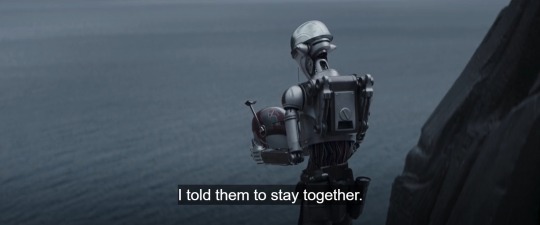
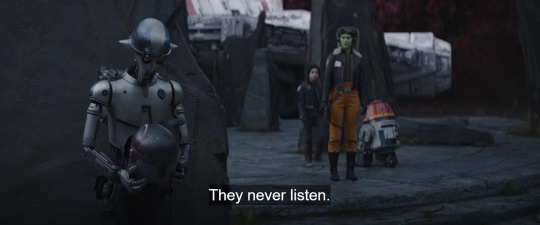
At first, when I heard Huyang say this, I obviously assumed he was talking about Sabine and Ahsoka.
But after hearing him repeat it a second time, I don’t think he is referring to just them specifically. I think he is talking about each and every single Padawan he has ever trained.
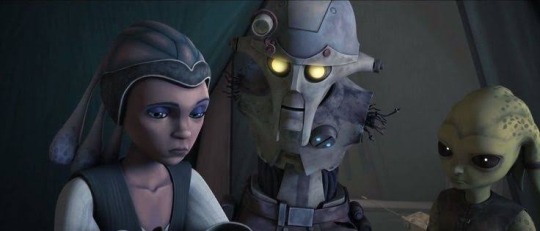
Huyang was programmed and built to last, virtually indestructible, perfect for a Jedi professor droid. But all the Younglings that he trained were flesh and blood and vulnerable. Naturally, because of his durability, Huyang is made to outlast and possibly outlive most of his students. But can droids even cry? To be one means to be cursed with an artificial version of immortality. You might even say that he was doomed from the start to watch every child that he ever raised die. But I don’t think he expected it to happen so quickly and so violently.
I can imagine him trying to comfort the last Younglings who were in his care, trying to reassure them while the Temple suddenly descended into a violent chaos that none of them had ever prepared for. But they probably panicked and didn’t listen to his final instruction to stay together.
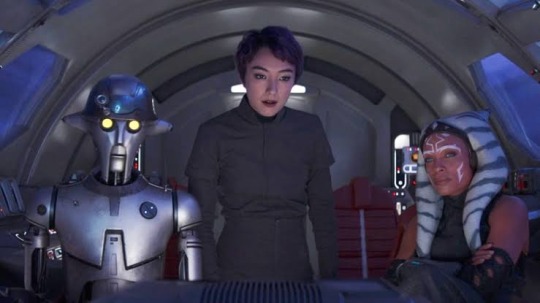
This is not the first time that Huyang has prepared himself to bury one of his own Younglings. But Ahsoka and Sabine were literally all he had left, so without them this means all his pupils are gone.
99 notes
·
View notes
Text
Let’s discuss two clips taken from a scene in Return of the Jedi.
The first thing to establish is the metatextual disclaimer that ROTJ was released in 1983. The prequel trilogy was released in 1999, 2002 and 2005 respectively. Because of this, it is important to note that most of the lore about the Jedi Order we know from newer canon does not apply when talking about this film in isolation. In an in-canon context discussion, this is irrelevant, but here I want to discuss specifically the themes and pivotal points to the characterization of Luke Skywalker as established by the original trilogy as a whole.
The entire ROTJ Dagobah sequence as it sits in the narrative is a direct response to the events of the ending of Empire Strikes Back, where Luke disobeyed Ben and Yoda’s instructions and abandoned his training to confront Vader and save his friends before he was ready. That scene in ESB on its own already establishes a rift between Luke’s values and the values of Ben and Yoda. However, it is heavily implied that Luke was wrong to do this because he loses to Vader on Bespin and nearly dies, just as Ben and Yoda feared. However, the revelation of Vader being Luke’s father changes the scenario drastically.
In the scene above and the scene prior to it (Yoda’s death), Luke directly confronts both of his teachers on being lied to about Vader’s true identity. Because up to this point, Luke knows he has been training to eventually kill Vader (and the Emperor). Not bring him to justice - kill him.
Luke, having idolized his father since childhood (as A New Hope establishes), is realistically troubled by the news that he now has to kill his father. So troubled, that he asks Yoda, “Is Vader my father?” just so he can be sure. Luke is visibly angry in this scene when Yoda insists that he knowing would have only made him act more irrationally and emotionally. That he wasn’t ready for the truth. But the underlying question remains, did Yoda or Ben ever really plan to tell Luke the truth? After all, Yoda is disappointed that Luke found out, because he knew it would create resistance.
Yoda and Ben are fearful of another Vader, and it’s why Yoda was reluctant to train Luke in the first place.
After this, Luke confronts Ben with the same question, upsetly saying, “You told me Vader betrayed and murdered my father.”
So now we have a second scene of Luke directly doubting his mentors’ motives. Whichever character you agree with being in the right as an audience member, however, is irrelevant, because in terms of character, Luke believes he is right, Ben believes he is right, Yoda believes he is right, etc. And instead of Luke blindly following the wills of his teachers, he truly starts to question whether being a Jedi for him is directly what Yoda and Ben want from him.
Ben laments in the scene above that Luke is their only hope and that Luke’s refusal to kill his own father without at least attempting to find the man he used to be is a doomed scenario. Ben and Yoda have every right to think this - they have seen Vader in both forms and have effectively lost hope in him. Luke, who has only seen a dark side of Vader, has more room for optimism to reclaim the Jedi Knight his father once was.
Not only this, but as a scene, Luke turning against Ben and Yoda’s wishes directly leads an audience to think: ‘Hmm. Vader went against the teachings of Ben and Yoda. Now Luke is doing it too. Is this his path to the Dark Side?’ Which is another narrative point to the scene. All of ROTJ is pushing this ‘what if’ now that we know Luke and Vader are related — all which builds to the ultimate climax of Luke’s decision in the final throne room fight.
“You cannot escape your destiny,” is what Ben says to Luke. But this is what Luke does.
He proves Ben and Yoda wrong.
He proudly proclaims that he’s still a Jedi, but in a way he believes in.
And it’s not even to say that he fully disagrees with Yoda and Ben, because he clearly respects them as his mentors. But Luke changes from ANH to ROTJ. He starts to form his own ideas about what a Jedi is to him, rather than what he’s supposed to do for the good of the galaxy. He makes a decision that he alone can stop Vader without killing him. That he’d rather lay down his life and die a Jedi than do what Yoda and Ben asked him to do (and ironically, what Palpatine also wanted him to do) and live as something he doesn’t believe in.
“Bury your feelings deep down, Luke. They do you credit, but they could be made to serve the Emperor.”
For full context, Ben says this immediately after revealing Leia’s true identity to Luke - which leads us to believe that Luke’s care for his sister is something that could be used against him (as we see in the throne room fight when Vader threatens Leia). Luke cares for Leia and Han immensely, hence why he risks everything to rescue them on Bespin. And ultimately his fear of losing Leia is what makes him snap in his fight on the Second Death Star (which we later learn in the prequels, of course, as a direct parallel, is that Anakin’s fear of loss is what drove him to the Dark as well - so it matches up that Lucas is focused on fear as the emotion Jedi must control above all else, and interestingly enough, fear is driving Yoda and Ben throughout the duration of the OT). His feelings served what the Emperor wanted from him - to kill Vader and take his place.
But Ben also says - “[your feelings] do you credit.”
A simple acknowledgment that maybe, maybe Luke’s endless compassion and determination could change something. For the audience, who is fearful that Luke may fall Dark, and for Ben, whose last bit of hope is left lingering on a sentence. “You were our last hope.”
Luke Skywalker is hope. He’s hope. He’s Ben’s hope. He’s Padmé’s hope. He’s Anakin’s hope. He’s Han and Leia’s hope. He’s the Rebellion’s hope. He’s the Jedi’s hope. He’s the universe’s hope. He’s a New Hope.
He represents all of that in this film - in this few seconds, we get so much character.
And this - quintessentially - is why ROTJ is the perfect blueprint for understanding Luke’s character. How he interprets the Jedi way, how he has complicated emotions that both serve him well and lead him astray, and how he triumphs through hope.
So in full — Luke redefines what being a Jedi is for himself. In ANH, he expects it to be a whimsical adventure (it is not). In ESB, he expects it to be whatever Yoda and Ben have planned for him (it is not). And in ROTJ, he doesn’t know what to expect anymore, but embracing what he feels is the right thing to do is what pushes him forward.
He claims the Jedi title in a way that is fully earned and does not need the approval of his mentors nor the standard training (that he would never get in his era anyway). The Jedi return because of Luke - but they come back different. And not in a direct ‘the Jedi of old were all bad’ way, but in a ‘looking towards the future’ way. Because Luke believes in and values the idea of making your own destiny and the flexibility of the Force’s will. An idea which would inevitably pass to his students (who would then have their own personal interpretations of the Jedi way or even the Force in general).
So yes — writing Luke in a way where he teaches exactly the way the old Code would’ve gone without critical thought, or having him lose faith in a student over a single bad feeling, or disregarding him (meta-textually) as a Jedi, or presenting him as sticking to a very strict and specific set of rules for how training is supposed to work, etc., is all directly contrasting to the arc we are presented in the original trilogy.
#sw meta#rotj#obi wan kenobi#yoda#luke skywalker#sw#mini essay#me using my film student analysis abilities to be 100% annoying about how much luke is such a good character 🤪#and how rotj perfects that character#and how disney keeps FUCKING IT UP#🥰#also wow this is longer than i thought it would be lol#long post
214 notes
·
View notes
Text
i think the Jedi-Positive and Jedi-Critical stances can be summed up on whether you value authorial intent or authorial execution.
Most of the Jedi-Positive people I follow quote George Lucas and director commentaries to prove their points, as well as utilize analyses from others at LucasFilm that have to keep the general status quo. It's all based on what Lucas was trying to portray, while ignoring the product in execution.
The Jedi-Critical stance tends to look at the prequel execution, and they question the obvious uncomfortable moments that have real-life parallels to atrocities. They tend to be more Legends fans, whose writers actually delved into the terrifying implications. It's all on criticizing execution while disregarding intent.
Like, take the argument about Jedi children. A Jedi-Positive person would argue that all the children are all given up with consent from their parents; this is what I am sure Lucas was intending to portray. A Jedi-Critical person will look at this and go "wait. how much 'consent' was in this encounter? the government can legally take these kids and have a representative show up to a farmer's house and tell the farmer they can technically say no? that is some bullshit." And there is real-life evidence for this. It's more on the execution.
Or the argument about love. Jedi-Positive people turn to Lucas's interview to show that they really meant it in the Buddhist sense, and if you value intent that works. Jedi-Critical people would argue that the marketing states that the Jedi cannot love, and nothing in the movies states that the Jedi meant non-toxic love when they eschew attachments.
They're both valid positions, but I think a lot of fandom brutality comes from not understanding either view, or demeaning one view in favor of another. It's perfectly acceptable to value one over the other.
#star wars#starwars#jedi#jedi order#the jedi order#star wars meta#sw fandom meta#sw#sw prequels#sw fandom#pro jedi#anti jedi#jedi critical#jedi positivity#I also think a lot of it is also based on filters as well#but i didn't want to crowd the post#lucas used a fairytale structure to write his story#but there's still a huge portion of deconstruction in canon stuff#maybe i'll write more
285 notes
·
View notes
Text
I know everyone likes to make fun of Ezra for believing Maul, but I honestly really liked that, because. Like. He's been working so hard to learn to trust people again. His new-found family is teaching him how to open up and how to let himself love others without being too afraid of losing them to connect
And he doesn't immediatly trust Maul, which shows that even if his trust issues are much better now, he's still not stupid and knows to be careful around strangers, especially if you found them inside a Sith Temple
But. Maul shows and tells him what he wants to see; he acts kind with him, reassures him when he's in doubt, and manipulates Ezra (who is a CHILD) into beliving in him so he could get what he wanted
Then he betrays him, and by blinding Kanan, he proves Ezra's 'little me' right
#i actually think it's beautiful how he still keeps trying even after having been hurt so many times#and it's not even about maul hurting him. it's about maul hurting kanan#like if maul hadn't done that then ezra would've been perfectly fine w having him as a slightly evil friend that his entire family hates#part of the reason why i love ezra is because bc even though he's been betrayed#he still works to be better#he still fights for what's right#still helps others. he can and will jump in the middle of the battlefield to save a stranger because that's who he is#and he always trusts his family to watch his back#he's been tempted by the dark side so many times and yet he's still “dark side? never heard of it”#and even when he DOES use the dark side. he gets better. he realices that what he's doing is wrong and GETS BETTER#ezra's world was violently taken away from him when he was only a child#he lived on the street for years with nothing but himself. he learned to never trust anyone and to always think for himself#he couldn't afford to help others (unless it wasn't TOO dangerous and he could get smth out of it) because he can't put himself in danger#he learns to forget his parents's beliefs#then the ghost crew comes along and they show him that world again#and now that he knows it he will never leave it again#star wars#star wars rebels#sw rebels#swr#ezra bridger#darth maul#star wars meta#sw meta#twilight of the apprentice#avis' post
81 notes
·
View notes